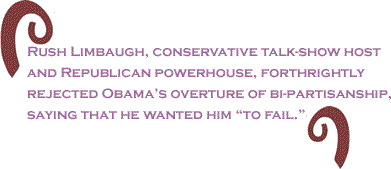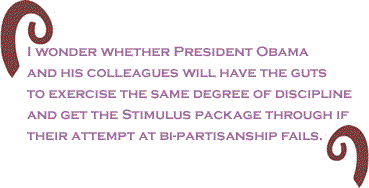
|
|||||||||||||||||||||||

|
|

Custom Search
|
|
 |
|
President Barack Obama’s pledge to bring America together and specifically attempt to work across party lines with Republicans in the governing process was laudable, but I always wondered if it would work. The principle reason is that the key to Republican power has been their remarkable clarity of ideology and the party discipline behind it. This was patently evident when Newt Gingrich took over in 1994 after the “Republican Revolution” netted 54 seats in the House and eight seats in the Senate, giving Republicans control of the Congress for the first time in 40 years. They promptly proceeded to rearrange the administration of the Congress in their own image and the ruthlessness of it caught Democrats by surprise, as they became virtually shut out of the governing process – not given legislative documents, not told where vital meetings were being held, and defeated time and again by party vote. In the first 100 days, Gingrich enacted every bill in the ten-point “Contract With America,” except for the proposed Constitutional Amendment mandating term limits for members of Congress. Despite the fall of that era, the pattern of disciplined, ideological behavior that made them dominant remains. For example, Rush Limbaugh, conservative talk-show host and Republican powerhouse, forthrightly rejected Obama’s overture of bi-partisanship, saying that he wanted him “to fail.” Whining that Obama would bring in a new season of Liberalism, he was fearful that the return of liberalism would bring back Affirmative Action. It seems that is what is really under the covers of the rejection of bi-partisanship. To his credit, Obama shot back in a meeting with Republicans, saying that they could not afford to participate in bi-partisan governance and listen to Rush Limbaugh at the same time, because he represented the narrow partisan politics of the past that he was trying to get beyond. It doesn’t seem, however, that they were listening to him. John Boehner, leader of the Republicans in the House, after the meeting with the President was over, promptly railed against the size of the Stimulus package and continued his opposition on Meet the Press (January 25), saying that there was a lot of “wasteful spending” in the package and little to spur job growth. John McCain picked up the criticism of Obama whose first act was to sign a series of Executive Orders, one of which limited the influence of lobbyist access to his administration. And even though had honored McCain with a dinner and asked for his help in passing his plan, but McCain called the new lobbying rules “disingenuous” and refused to support the Stimulus in its “current form.”
Then, Texas Republican John Cornyn used his extraordinary power as Senator and held up confirmation proceedings for Eric Holder, Attorney General-designate, attempting to get assurances from him that he will not pursue legal actions against the presumptive illegalities of George Bush’s administration. For example, the investigation into the use of intelligence by the Bush White House and Dick Chaney are still live issues, such as whether a crime was committed in “outing” a secret agent contrary to federal law. And although one notices that Bush did not pardon Scooter Libby, there are also issues of torture by the administration, the illicit use of federal funds in contracting related to the Iraq war and others that could serve as a basis for indictment. I recently watched the proceedings of the Appropriations Committee and the Committee on Ways and Means in the House as they processed the Stimulus package amendments. The pattern of Republican opposition to the measure was strong and their intent to have their way just as apparent; I could see little evidence that the word to exercise bi-partisanship had come down from on high. Given the intransigence of the Republicans – they once called the Democrats “obstructionists” for not going along – I wonder whether President Obama and his colleagues will have the guts to exercise the same degree of discipline and get the Stimulus package through if their attempt at bi-partisanship fails. It always seems that Democrats are the givers and Republicans are the takers. That has got to end if Obama is to “turn the page” on the conservative dominance in American politics. BlackCommentator.com
Editorial Board member
Dr. Ron Walters is the Distinguished Leadership Scholar, Director
of the African American Leadership Center and Professor of Government
and Politics at the University of Maryland College Park. His latest
book is: The
Price of Racial Reconciliation (The Politics of Race and Ethnicity) |
|
Any BlackCommentator.com article may be re-printed so long as it is re-printed in its entirety and full credit given to the author and www.BlackCommentator.com. If the re-print is on the Internet we additionally request a link back to the original piece on our Website. Your comments are always welcome. eMail re-print notice
If you send us an eMail message we may publish all or part of it, unless you tell us it is not for publication. You may also request that we withhold your name. Thank you very much for your readership. |
|
| |
|
| January
29, 2009 Issue 309 |
|
| Executive Editor: Bill Fletcher, Jr. |
| Managing Editor: Nancy Littlefield |
| Publisher: Peter Gamble |
| Est. April 5, 2002 |
Printer Friendly Version
in resizeable plain
text format or pdf
format. |
| Frequently Asked Questions |
 |

|
 |
 |
 |
| |
| |






































